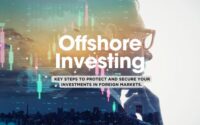The Hidden World of Offshore Investing: 7 Secrets Banks Don’t Want You to Know

Welcome to the Shadowy Side of Wealth
When you hear the term “offshore investing,” you might picture secret bank vaults in the Cayman Islands, shadowy billionaires, or hidden accounts packed with untaxed millions. While there’s a bit of mystery to it, offshore investing is far more accessible and legal than you might think. In fact, smart investors from all walks of life are using offshore strategies to protect their wealth, lower taxes, and diversify their portfolios.
Disclaimer: This article is for informational purposes only and does not constitute financial, legal, or investment advice. Offshore investing involves complex legal, tax, and regulatory considerations that vary by country. Readers should consult with a qualified attorney, tax advisor, or financial professional before taking any action
But here’s the kicker: banks don’t want you to know how it works. Why? Because offshore investing takes away control from traditional financial institutions. Instead of keeping your funds in their accounts, you’re placing your money in foreign markets, offshore trusts, or tax-advantaged accounts that can reduce fees, cut taxes, and increase returns.
If you’ve ever wondered what’s really behind the offshore curtain, you’re in the right place. Below, we reveal 7 secrets about offshore investing that banks prefer you didn’t know. These secrets aren’t just for billionaires — they’re for anyone looking to take control of their financial future.
1️⃣ Offshore Accounts Aren’t Just for the Wealthy 💰
The Myth
“Offshore accounts are only for millionaires and billionaires.”
False. This is one of the biggest lies that keeps everyday investors away from offshore opportunities. While it’s true that the wealthy have historically used offshore accounts to manage their fortunes, modern offshore accounts are more accessible than ever.
The Truth
Today, you can open an offshore bank account with as little as $500 to $1,000. Many offshore banks cater to everyday investors, expats, and freelancers looking for higher interest rates, currency diversification, and lower fees. In fact, banks in places like Estonia, Georgia, and Belize welcome global clients with small deposit requirements.
Some of the most popular options for everyday investors include:
- Offshore Savings Accounts: Earn higher interest rates than domestic banks.
- Multi-Currency Accounts: Protect against currency fluctuations (great for expats).
- Offshore Brokerage Accounts: Invest in international stocks, ETFs, and bonds that aren’t available in your home country.
Pro Tip 💡: Want to get started? Look into offshore banking hubs like Belize, Cayman Islands, Estonia, and Georgia, as these countries have low deposit requirements and fast onboarding for non-residents.
2️⃣ Tax Benefits Are Real (And Legal) 🏦
The Myth
“Offshore investing is illegal tax evasion.”
Nope. Offshore investing is 100% legal if done properly. The confusion comes from the fact that offshore investing is often associated with “tax havens” like the Cayman Islands. But in reality, there are perfectly legal ways to reduce your tax burden using offshore strategies.
The Truth
Many countries offer tax incentives to attract foreign investors. These incentives may include:
- No capital gains tax: Certain offshore jurisdictions have zero capital gains taxes, so if you sell an investment at a profit, you keep 100% of it.
- Lower corporate taxes: If you open an offshore business, you can operate in countries with tax rates as low as 2-10% (compared to 21% in the U.S.).
- Tax Deferral: Offshore accounts can allow you to defer taxes on earnings until you repatriate (bring the money back to your home country).
Example 💡: If you invest in Singapore ETFs using an offshore brokerage, your gains are tax-free in Singapore. You’ll only pay taxes when you transfer the money back home, and even then, you may qualify for foreign tax credits.
Countries known for tax advantages:
- Singapore (no capital gains tax)
- United Arab Emirates (no personal income tax)
- Cayman Islands (no direct taxes)
- Bermuda (zero corporate taxes for many businesses)
What Banks Don’t Want You to Know
Banks want you to think that keeping your money at “home” is safer and more compliant, but they rarely tell you about foreign tax treaties. For example, countries like Malta, Cyprus, and Ireland have tax treaties with major economies (like the U.S. and U.K.) that allow you to avoid double taxation.
Pro Tip 💡: When opening an offshore account, ask if the country has a tax treaty with your home country. It can reduce your taxes on dividends, interest, and profits from investments.
3️⃣ Offshore Trusts Are a Bulletproof Asset Protection Strategy 🔒
The Myth
“Trusts are only for billionaires hiding assets from the IRS.”
Not quite. Offshore trusts are completely legal and widely used to protect assets from creditors, lawsuits, and ex-spouses. While billionaires use them for estate planning, regular investors and business owners use them too.
The Truth
Offshore trusts place your assets (like cash, real estate, and investments) in a legal structure that’s shielded from lawsuits, divorce settlements, and creditors. Unlike a standard trust, an offshore trust operates under the laws of a foreign country — giving you an extra layer of protection.
Here’s how it works:
- You transfer assets into a trust (like real estate, cash, or stock).
- The assets are managed by a trustee under a strict legal framework.
- Your assets are now outside the reach of creditors, lawsuits, and legal claims from your home country.
Where to Set Up an Offshore Trust
Certain countries have better laws for asset protection trusts. Here are the best options:
- Cook Islands: The gold standard for lawsuit-proof trusts. Even if someone wins a lawsuit against you, they still can’t touch your assets.
- Nevis: Extremely strong privacy laws and short statute of limitations for creditors.
- Belize: Similar benefits to the Cook Islands but with faster setup and lower costs.
How Banks Lose Control
Banks want you to store your assets with them, but once you move assets to an offshore trust, the bank loses control. Your money is no longer “theirs.” It’s under the control of an offshore trustee, making it harder for banks, courts, or creditors to seize it.
Example 💡: If you run a business and get sued, the plaintiff can try to seize your bank accounts. But if your funds are inside a Belize Asset Protection Trust, it’s nearly impossible for the court to claim your money.
Why This Matters
- Bulletproof Asset Protection: Your assets are shielded from lawsuits, divorce settlements, and bankruptcy claims.
- Global Diversification: Your assets are stored in a different legal system, so no single government can seize them.
- Estate Planning: Offshore trusts are used for generational wealth transfers, especially in high-tax countries like the U.S.
Pro Tip 💡: If you want to create an offshore trust, consult a lawyer with experience in Belize, Nevis, or Cook Islands trusts. These jurisdictions are known for their airtight legal structures.
4️⃣ You Can Open an Offshore Account Without Leaving Home 🌐
The Myth
“To open an offshore account, you have to fly to the Cayman Islands or Panama.”
The Truth
Gone are the days when opening an offshore account required in-person visits and expensive flights. Thanks to online banking platforms and digital verification tools, you can now open an offshore bank account 100% remotely from the comfort of your home.
How It Works
- Choose an Offshore Bank: Look for banks in jurisdictions like Belize, Estonia, and Georgia, as they allow non-residents to open accounts online.
- Submit Documents Online: Upload your passport, proof of address, and a “source of funds” statement via the bank’s secure portal.
- Identity Verification: Most banks conduct a video call or use e-signature services to verify your identity.
- Account Approval: Once approved, you get access to the bank’s online platform, where you can manage your money, send transfers, and make investments.
What Banks Don’t Want You to Know
Banks in your home country want you to believe that you need to “bank local” for convenience. But offshore banks often have lower fees, higher interest rates, and multi-currency support. For example, banks in Georgia and Mauritius offer up to 7-10% interest rates on savings accounts, compared to 0.1% in U.S. banks.
Pro Tip 💡: Start with banks like Wise (formerly TransferWise), N26, or Revolut for an easy introduction to international banking. For full offshore accounts, check out Caye Bank (Belize), TBC Bank (Georgia), or Rietumu Bank (Latvia).
5️⃣ Offshore Banking Isn’t as Private as It Used to Be 🔍
The Myth
“Offshore accounts are anonymous and untraceable.”
The Truth
This used to be true — but thanks to international pressure from organizations like the OECD and FATF, most offshore banks now share information with tax authorities in your home country. This process is called CRS (Common Reporting Standard), which is a global framework for tax transparency.
While offshore banks still offer more privacy than local banks, they are required to report information about account holders to tax authorities in countries that have signed the CRS agreement.
How It Works
- Bank Shares Data: Your offshore bank shares data about your account (like balances, interest, and dividends) with your home country’s tax authority.
- Home Country Notified: Your home country (like the U.S. IRS) receives the info and checks if you’ve reported the offshore account properly.
- Filing Requirements: If you’re a U.S. citizen, you must report foreign accounts with a balance over $10,000 using FBAR (Foreign Bank Account Report).
What Banks Don’t Want You to Know
Banks want you to think your offshore accounts are 100% private, but in most cases, your government already knows about them. If privacy is your goal, consider jurisdictions that have not signed CRS agreements, like Belize, Cook Islands, and Cambodia, which don’t report to the CRS network.
Pro Tip 💡: Privacy is still possible if you use an offshore trust. If a trust owns the offshore account (rather than you), it’s not always subject to the same CRS reporting rules.
6️⃣ Offshore Investing Can Protect You From Currency Collapse 💸
The Myth
“My local bank is good enough — I don’t need offshore protection.”
The Truth
If your local currency collapses (like Argentina’s peso or Venezuela’s bolívar), your life savings could be wiped out overnight. Offshore accounts let you store wealth in stronger, more stable currencies, like the U.S. dollar (USD), euro (EUR), and Swiss franc (CHF).
How It Works
- Open a Multi-Currency Account: Offshore banks like Revolut, Wise, and N26 let you store money in USD, EUR, GBP, and more.
- Convert Funds in Real Time: If you notice your local currency is dropping, you can convert to USD or EUR instantly.
- Protect Against Inflation: Storing money in “strong currencies” protects your purchasing power from local inflation.
Example of Currency Collapse
In Argentina, inflation hit 100% in 2023, meaning the cost of everyday goods doubled. Those with offshore accounts in USD saw their wealth preserved, while those with pesos suffered devastating losses.
Pro Tip 💡: Offshore banks in Singapore and Switzerland let you hold multi-currency accounts, giving you flexibility to store wealth in strong, stable currencies.
What Banks Don’t Want You to Know
Traditional banks have little to gain when you move money offshore, so they rarely mention the risk of currency collapse. Offshore banks, however, let you hedge your savings against local currency risks. This strategy is especially useful if you live in an economy with high inflation or currency instability.
Pro Tip 💡: If you’re new to this, try Revolut or Wise for easy, multi-currency accounts that don’t require offshore banking paperwork.
7️⃣ Offshore Investing Can Supercharge Your Portfolio 📈
The Myth
“Domestic investments are safer and more profitable than offshore options.”
The Truth
If you only invest in your local stock market, you’re missing out on massive global opportunities. Offshore investing allows you to access:
- Emerging Markets: Fast-growing economies like India, Vietnam, and Indonesia.
- Global Dividend Stocks: International stocks often pay higher dividends than U.S. stocks.
- Private Equity: Get access to exclusive investment opportunities like pre-IPO companies and venture capital funds.
How It Works
- Open an Offshore Brokerage Account: Use brokers like Interactive Brokers or Saxo Bank to access global markets.
- Invest in Emerging Markets: Look for ETFs that track emerging economies, like iShares MSCI Emerging Markets ETF (EEM).
- Diversify Your Portfolio: Add international real estate, private equity, and hard assets like gold or precious metals.
Example of Offshore Portfolio Diversification
Let’s say you have 100% of your money in U.S. stocks. If the S&P 500 drops 20%, so does your wealth. But if you diversify into offshore investments like emerging market ETFs, gold, and private equity, you reduce your exposure to any single market collapse.
What Banks Don’t Want You to Know
Banks want you to invest in local funds, ETFs, and savings accounts — because they earn fees on those products. Offshore investments, on the other hand, put your money into opportunities outside their control. They’d rather you keep your wealth tied up in domestic mutual funds.
Pro Tip 💡: Use platforms like Interactive Brokers to access international stocks, ETFs, and private equity funds. You’ll gain access to global opportunities that most local banks can’t offer.
Quick Recap:
You’ve now uncovered the 7 offshore secrets banks don’t want you to know:
1️⃣ Offshore accounts aren’t just for the wealthy.
2️⃣ Tax benefits are 100% legal.
3️⃣ Offshore trusts offer bulletproof protection from lawsuits.
4️⃣ You can open an offshore account without leaving home.
5️⃣ Offshore banking isn’t as private as it used to be.
6️⃣ Currency collapse protection is only possible with offshore accounts.
7️⃣ Offshore investing can supercharge your portfolio with access to global opportunities.
If you’re ready to protect your wealth, diversify your assets, and unlock global investment opportunities, it’s time to explore offshore banking and investing. The process is easier than you think — and far more accessible than banks would like you to believe.



